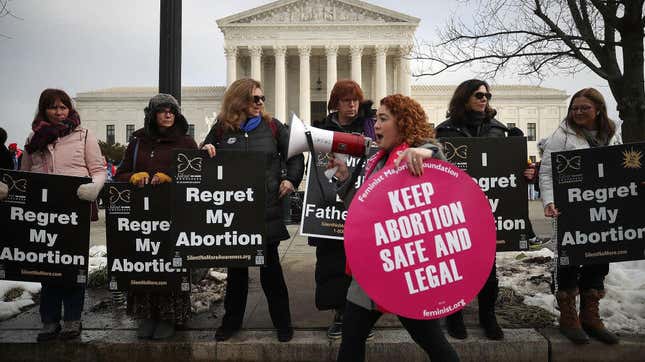
The U.S. Supreme Court on Friday announced it would review an anti-abortion law out of Louisiana in a case being seen as a test of the impact Donald Trump’s newly picked conservatives on the court will have on women’s right to choose to have the procedure.
At issue is a Louisiana law that requires doctors performing abortions to have admitting privileges at a nearby hospital, the Washington Post reports.
Opponents say the law imposes an undue burden on abortion providers that will result in doctors opting out and just one abortion doctor left in the state.
With recent Supreme Court Justices (and Trump appointees) Neil Gorsuch and Brett Kavanaugh now on the bench, tipping the balance of power in favor of conservative justices, abortion-rights advocates fear the outcome.
“Access to abortion is hanging by a thread in this country, and this case is what could snap that thread,” Alexis McGill Johnson, acting president of Planned Parenthood Federation of America, said in a statement, the Post reports.
Anti-abortion forces are equally as hyped about what could be the high court’s decision, as the Post reports.
“The Supreme Court now has a chance in this case to reconsider, reverse, and return Roe v. Wade and the issue of abortion to the American people, which is long overdue,” Students for Life of America President Kristan Hawkins said in a statement. “States should absolutely have the right to pass their own health and safety standards designed to protect women inside abortion vendors.”
After a lower federal appeals court upheld the law, the U.S. Supreme Court weighed in last February, delaying its implementation, but not fully ruling on the law’s constitutionality.
Oddly enough, the Supreme Court in 2016 had struck down a similar law in Texas, but the lower federal appeals court, rather than ruling in line with the high court’s precedent, found that Louisiana’s take was somewhat different from Texas’.
Court-watchers say the Supreme Court’s move to take the case already demonstrates the impact Justices Gorsuch and Kavanaugh are having.
Legal expert and Root 100 2019 honoree Elie Mystal in an article for The Nation placed the blame on Kavanaugh, writing:
The fact that the Supreme Court did not summarily reject the [lower federal appeals court’s] opinion is why abortion rights advocates, and rule of law advocates, are so troubled. The only significant change in the legal conversation around TRAP laws is that in 2016 Anthony Kennedy was on the court, while now we have Kavanaugh.
Planned Parenthood’s McGill Johnson, in her statement seemed to concur:
“There’s only one reason the court would not strike down the Louisiana law and that is because [now retired] Justice [Anthony] Kennedy, who voted to protect abortion access just three years ago, has been replaced with Justice Kavanaugh. This is what we’ve warned about.”

